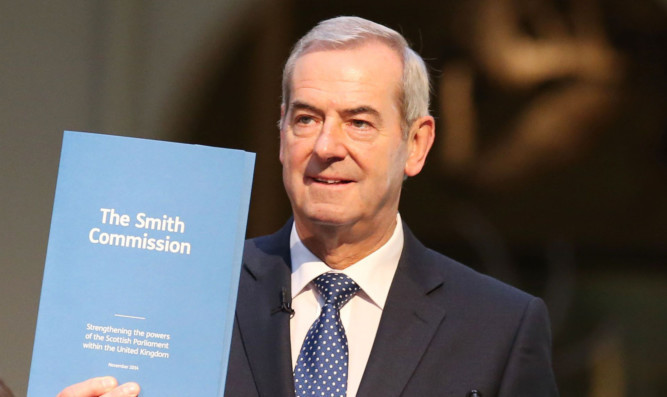The Government’s proposals for further devolution of powers to Scotland were rushed through with insufficient consultation and without proper consideration of their implications for the rest of the United Kingdom, a parliamentary report has warned.
All three major party leaders signed up to a “vow” to deliver further devolution last September, in a bid to head off a Yes vote in the independence referendum, and the Smith Commission drew up proposals for change within three months of the vote.
In the new report, the House of Lords Constitution Committee said that the party leaders’ public commitment to change appeared to have “pre-empted any meaningful scrutiny” of the proposals by the public or parliaments in Westminster and Holyrood and voiced “deep concern” at the speed with which Lord Smith of Kelvin was told to complete his work, which did not allow “adequate time for engagement and consultation”.
The committee expressed “astonishment” that the UK Government “do not appear to have considered the wider implications for the United Kingdom of the proposals” and said it was “not appropriate or sustainable” to address the issues of additional powers for Scotland alone without considering the knock-on consequences for the wider UK constitution.
Its report found that the process leading up to the proposals being set out “does not meet the expected standard for implementing proposals for constitutional change” and “undermines confidence in the outcome”.
The UK Parliament should not “simply accept these significant constitutional changes as a fait accompli” but should “ensure they receive the detailed scrutiny they require and any amendment that may be necessary”, said the report.
Committee chairman Lord Lang of Monckton said: “The recommendations in the Smith Commission report clearly have profound constitutional implications for every part of the UK. However the UK Parliament is expected to pass these proposals into law without significant amendment despite having been, in effect, excluded from the decision-making process. This is not the way to implement significant constitutional change.
“We were astonished to hear that the Government have not properly considered the impact on the rest of the UK of implementing the Smith Commission proposals. Piecemeal, ad hoc changes to the Scottish devolution settlement without wider consideration of their impact could well destabilise the Union as a whole in the longer term.
“The major UK-wide political parties need urgently to devise and articulate a vision for the future shape of the Union and its devolution settlements. Without this, there cannot be any long-term constitutional stability.”
SNP Westminster leader Angus Robertson said: “The Smith Commission’s recommendations were already underwhelming and were then watered down further by the UK government’s paper. Now we have unelected Lords being grudging about even these reduced powers.
“The Lords report concludes with a call for the UK Parliament to ‘not simply accept’ more powers for Scotland.
“This follows on from a similar House of Commons report, and is the kind of out-of-touch approach that is doing such damage to all of the Westminster parties, and for which they may pay a heavy price for at the general election.”
